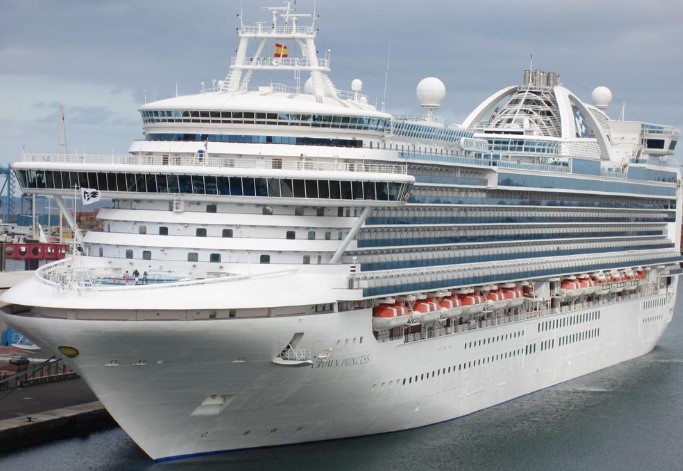Testing rules for travellers to the UK will revert largely to where they were months ago, the health secretary has said.
Airlines, holiday firms and cruise and ferry lines are aghast at the latest government U-turn, just a week after the red list was revived and testing rules toughened.
Sajid Javid has also extended the red list. Travellers returning from Nigeria must go into hotel quarantine at a cost of thousands of pounds.
These are the key questions and answers.
What has changed?
The government has added extra Covid-19 checks for everyone aged 12 and over travelling to the UK from any foreign country except Ireland and Ethiopia. This is in addition to the PCR test on arrivals that was introduced on 30 November.
The move applies for travellers arriving from 4am on Tuesday 7 December. It will add cost and complexity to Christmas and New Year plans for millions of travellers – and increase uncertainty for anyone thinking of going away.
Arrivals from Africa’s most populous country, Nigeria, must enter “managed isolation”, as hotel quarantine is known, for 11 nights. They join travellers from 10 southern African countries.
Anyone who arrived from Nigeria before 4am on Monday deadline is “strongly encouraged to isolate at home, and their household should also self-isolate for 10 days starting with their arrival”.
The changes are in response to concerns about the spread of the omicron variant of coronavirus. It follows 21 cases of omicron reported in England that were linked to travel from Nigeria.
Mr Javid tweeted: “In light of the most recent data we are taking further action to slow the incursion of the omicron variant.
“Vaccines remain our first line of defence – the best way to protect yourself and your loved ones.
“Please get vaccinated or #GetBoosted as soon as you can.”
What tests will I now need?
From 4am on Tuesday fully vaccinated arrivals must take a pre-departure test, which can be lateral flow/rapid antigen or PCR, in addition to the post-arrival PCR.
As PCR tests are slower and more expensive, most travellers will settle for a quick, cheap lateral flow. Self-administered tests taken from the UK, including those using photographic evidence, are acceptable.
Professionally administered tests are more likely to give an accurate result.
NHS tests cannot be used.
Britain’s biggest holiday company, Tui, is telling customers: “We would like to reassure customers that their holiday is still due to operate as planned, and our destination teams are confirming testing availability for customers in resort.
“Customers in resort should contact their TUI representative for their nearest testing clinic.”
How far in advance must I take the pre-departure test?
The Department of Health and Social Care (DHSC) says the test must be taken on the day of departure or one of the two preceding days. The much-publicised “48-hour” rule announced by the health secretary does not exist.
For a Wednesday flight from the US to the UK, arriving the following morning, you could test on Monday, Tuesday or Wednesday. So for a 9pm flight on Wednesday, you could in theory take the test at 9am on Monday – 60 hours before departure.
The latest amendment to The Health Protection (Coronavirus, International Travel and Operator Liability) (England) Regulations 2021 says the test sample must be taken “no more than three days before” the scheduled departure time of the commercial transport service to England. This suggests a maximum of either 72 hours or three full days before the day of departure, but the DHSC disagrees with that interpretation.
How much is this going to cost?
Pre-departure tests will depend on prevailing prices in the location – typically €25-€30 (£21-£25) in Europe.
A negative certificate will need to be presented to the airline, shipping firm or train operator before departure. In addition, each traveller aged five or over (from aged 11 in Scotland) must book a post-arrival PCR test, typically costing £40-£70.
What if I am on a very short journey?
On a day trip (whether on business or a journey to Lapland) you should test in the UK before departure to the overseas country. This can also apply for trips of up to three days, such as travelling to Paris for a weekend – out on Friday, back on Sunday.
With France now requiring a pre-departure test, you could use the same result both to enter France and to return to the UK.
The value of such a test in identifying possible infections picked up abroad is zero, but it is required to comply with the law.
What are the rules for unvaccinated travellers?
The rules remain almost the same: a pre-departure test two days ahead (down from three days), PCR tests booked for days two and eight and self-isolation for 10 days – reduced to five in England if you take a “test to release” halfway through.
Haven’t we been here before?
Yes. The government’s refrain is: “Let’s test again, like we did last summer”. From May to September 2021, fully vaccinated travellers to the UK had to take both pre-departure and post-arrival tests. The pre-departure test was scrapped for double-jabbed passengers on 22 September.
From 24 October, travellers could opt for a cheaper and faster lateral flow test on arrival.
The transport secretary, Grant Shapps, said in October: “We are accelerating towards a future where travel continues to reopen safely and remains open for good.”
“With more than eight in 10 people now fully vaccinated, we are able to take these steps to lower the cost of testing and help the sector to continue in its recovery.”
On 1 December he told Christopher Hope of the Telegraph that pre-departure tests would not return because to do so could “kill off the travel sector again”.
But the rules have now reverted to where they were in summer, but with an added twist: travellers must self-isolate until a negative PCR result is received.
Mr Shapps tweeted on Saturday evening: “As the scientists work to understand new omicron variant we need to apply additional caution until the picture is clearer.
“We appreciate this will be difficult for the travel sector as we prioritise public health and protect the progress of our world-leading vaccination and booster programme.”
What happens if I test positive abroad?
You must immediately notify the local health authority and follow their instructions for isolation, which could be at your cost. Some travel insurance policies will cover the costs involved.
Travel firms will generally be flexible about moving bookings for people who test positive ahead of their flight/ferry/train and allow postponement.
I have recovered from Covid-19 and worry about false positives. Can I get an exemption from testing?
No. The Department of Health says: “If someone has tested positive with a PCR test, they should not be tested using either PCR or rapid lateral flow tests for 90 days.” But regardless of recovery status the government still insists on all travellers taking the two tests.
The Department for Transport says: “If you have recently recovered from Covid but are no longer infectious, you should use a lateral flow device (LFD) test. LFD tests have a lower sensitivity than PCR or Lamp tests, so they are less likely to return a positive result from a historic infection .”
While lateral flow is clearly the best option for the pre-departure test, there is no option but to take a PCR test on arrival in the UK.
What if someone tests positive for omicron on my flight?
You must self-isolate for 10 days.
How am I supposed to test if I am on a cruise returning to the UK?
Typically a cruise from the Canary Islands will call at Lisbon in Portugal and then spend two full days at sea before arrival in Southampton. Some larger ships have testing programmes on board; otherwise it will be required in the last port of departure before the UK.
A spokesman for P&O Cruises said: “We are aware of the change in guidance regarding pre-UK arrival testing and we are liaising with the relevant government and industry authorities regarding how this will affect cruise passengers.
“Once we have further details we will provide an update as soon as possible.”
What is this doing to traveller confidence?
The will to travel is being rapidly eroded. With two very significant changes in the space of a week, many travellers will conclude that the risk of being caught by hotel quarantine or unexpectedly high testing costs render journeys too uncertain.
How has the travel industry responded?
With renewed fury at the government’s latest U-turn on testing.
The chairman and chief executive of British Airways, Sean Doyle, said: “The blanket re-introduction of testing to enter the UK, on top of the current regime of isolation and PCR testing on arrival is completely out of step with the rest of the world, with every other country taking a measured approach based on the science.
“Our customers will now be faced with uncertainty and chaos.
“Yet again this is a devastating blow for everyone who works in the travel industry.”
Martin Chalk, general secretary of the pilots’ union, Balpa, said: “The new costs and stress of travel seem designed to destroy confidence in air travel and the idea of families being confident in booking to reunite over the holidays, many for the first time since Covid, is now a cruel joke.”
Tim Alderslade, CEO of the industry body Airlines UK, said: “It is premature to hit millions of passengers and industry before we see the full data. We don’t have the clinical evidence.
“We know from experience that blanket restrictions do not stop the importation of variants. It’s already here.
“They’ve now changed their travel advice twice within a week and it’s just impossible for anyone to plan.
“These measures must be removed as quickly as possible in line with the speed of the booster programme.”
He added, though, that “The red list extension made complete sense – that’s what it’s there for.”
The veteran tour guide and photographer, Paul Goldstein, said: “This woeful government seem determined to hammer a few nails in the industry’s coffin and starve everyone in Africa.
“The variant is well and truly out of the bag anyway and I struggle to see how this draconian edict could ever be described as ‘learning to live with Covid’.”
Are there any ways to get around the red list?
Some travellers will, legally and responsibly, travel from Nigeria to a third country and remain there for 10 full days before continuing to the UK. Egypt is a possibility.
Anyone seeking to “launder” their red list status in this manner must check that the third country will allow them in, and is taking the risk that the chosen location will itself go onto the red list.
Are there enough hotel quarantine rooms?
The government says it has “contracted several new hotels to enter service this week, in response to the likely numbers of UK residents who will want to travel from Nigeria before Christmas”.
It says it is “working at pace to expand Managed Quarantine Service capacity, but passengers are advised that hotel bookings may be limited as new hotels are onboarded”/
But travellers will not be allowed to travel to the UK from a red list country without a hotel quarantine booking. So they may need to remain in Nigeria until a room becomes available.
When will the rules change again?
On 27 November, the prime minister said a review will be announced on Saturday 18 December. It will now happen on Monday 20 December.






More Stories
Canadian government issues Travel Advisory for thriteen Mexican states
Canada Issued Travel Advisories For These 7 Tourist Hot Spots & It Could Affect Your Trip
Mexico-bound snowbirds face stern travel warning from government